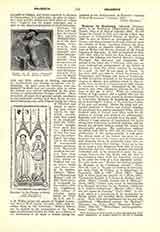

Brasseur de Bourbourg, CHARLES ETIENNE, ASNE, b. at Bourbourg (Departement du Nord), France, 1814; d. at Nice in January, 1874. He left France for Canada in 1845 and was for a short time professor of ecclesiastical history at Quebec. In 1846 he was at Boston as vicar-general of that diocese, and then returned to Europe where he spent two winters at Rome, searching archives for documents relative to Spanish America. In 1848 he went to Mexico and became chaplain of the French Legation at that city. In 1851 he returned to Paris until 1854, when he sailed for New York and from there to the Isthmus and Central America, visiting Nicaragua, San Salvador, and Guatemala. He arrived in the latter city February 1, 1855, and was made ecclesiastical administrator of the district of Rabinal in Vera Paz which position he occupied for a year. In 1857 he was again in France. In the years 1859 and 1860 he visited the Isthmus of Tehuantepec and Chiapas, also parts of Guatemala. In 1864 he became attached to the French scientific mission to Mexico, but political events in that republic drove him back to Guatemala in 1865, whence he returned to Europe. Exhausted by his long, arduous, and often dangerous labors, he died at Nice at the age of sixty. While an ecclesiastic worthy of high respect, and a teacher who has left a good record in the short period he devoted himself to instruction, Brasseur de Bourbourg was, above all, an indefatigable student of the American Indian, of his past and present. Hence the many and protracted journeys in Mexico and Central America, his permanent stay among aboriginal tribes, and his frequent visits to Europe were often made for the purpose of delving into archives for ethnographic, linguistic, and historic material from the past. He collected a large number of manuscripts and prints dating from early times in Central America, and improved his apostolic labors among the Indians for ethnographic purposes. His publications embrace the period from 1857 to 1871, and the value of these publications, if not unimpeachable, is still great. His defects were, at the outset, too great an enthusiasm and too vivid a fancy, and his intercourse with Prescott, whom he personally knew, was not calculated to lessen these failings. Later on, he was led to tread a very dangerous field, that of tracing relationships between American peoples and Eastern civilization and, as he advanced in years, the connection between the Old World and the New in pre-Columbian times, while not impossible, assumed in his mind the form of a fact absolutely certain. His main works are: “Histoire des Nations civilisees du Mexique et de l’Amerique centrale” (Paris, 1857-59, 4 vols.); “Voyage sur l’Isthme de Tehuantepec clans l’etat de Chiapas et la Republique de Guatemala, 1859 et 1860” (Paris, 1861); “Popol Vuh, le Livre sacre des Quiches, etc.” (Paris, 1861); “Grammaire Quichee et le drame de Rabinal Achf” (Paris, 1862); “Quatre Lettres sur le Mexique” (Paris, 1868); “Cartas para servir de Introduction a, la Historia primitiva de las Nations civilizadas de la America setentrional” (Mexico, 1851); “Relation des choses du Yucatan” (Paris, 1864). In this work, which is a translation of the manuscript by Bishop Landa, the so-called Maya characters are given. Their value and significance are not yet fully established; “Monuments anciens du Mexique” (Palenque, etc., Paris, 1866); “Manuscrit Troano” (Paris, 1869-70); “Bibliotheque mexico-guatamalienne” (Paris, 1871).
AD. F. BANDELIER

